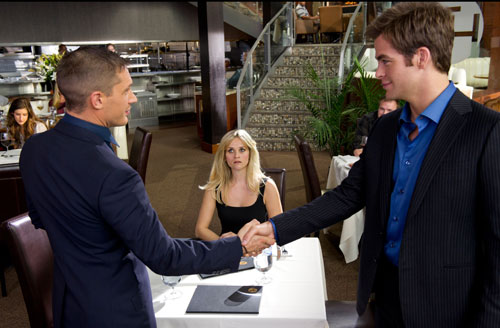‘This Means War’ a slogging bromance

What would Cary Grant do?
That’s the question I generally ask myself when pondering a new romantic comedy: Is this the sort of movie Cary Grant would do? (Grant being, of course, the gold standard when it comes to combining on-screen love and laughs.)
In the case of this week’s "This Means War" (which opens today following a Valentine’s Day sneak preview), the answer’s an emphatic hell to the no.
At least not as "This Means War" is (under)written.
Yet the answer’s a bit more complicated than that, considering all the Cary Grant movies (starting with the Oscar-winning "The Philadelphia Story") that employ "This Means War’s" central premise: that old standby, the romantic triangle.
Truth be told, "This Means War" has at least as much in common with all those frothy Doris Day comedies of the ’50s and ’60s, in which a successful career woman finds herself torn between two suitors: one a logical and proper prospect (think Tony Randall), the other a carefree playboy who’s not the type to settle down (think Rock Hudson). That is, until our gal Doris inspires him to change his ways — and his mind.
Those movies may seem hopelessly quaint by contemporary standards, but at least they get the numbers right. Which means that, by the obligatory happy ending, all the interior angles add up to 180 degrees.
That’s more than you can say for "This Means War," which seldom adds up at all.
Maybe that’s because it’s more successful — success being a relative term — as a bromance than a romance.
As comrades-in-arms and BFFs, leading men Chris Pine and Tom Hardy display far more chemistry than either demonstrates with leading lady Reese Witherspoon. And that’s just for starters.
As "This Means War" stumbles, bumbles and fumbles along its boulder-strewn narrative road, it’s constantly begging those of us in the audience to overlook the lapses in logic slapping us in the face.
Let’s start with our protagonists: FDR (a breezy Pine) and Tuck (chameleon charmer Hardy).
They’re supposedly covert CIA operatives (nobody bothers to explain what a true Brit like Hardy’s doing working for Uncle Sam, but nevermind), on assignment in Hong Kong to bring in notorious Eurotrash villain Heinrich (surly Til Schweiger ) without attracting undue attention.
So, naturally, our two heroes bust up the joint and let him escape, prompting their bitch-in-heels boss (dramatic powerhouse Angela Bassett, wasted in a brief one-note role) to recall them to the L.A. office.
Once there, the two wind up on desk duty. During (hardly) working hours, that is.
After hours, FDR continues his carefree bachelor life, while divorced dad Tuck ponders a plunge into the online dating pool.
Meanwhile, lovelorn Lauren (Witherspoon), an ace consumer products tester, keeps encountering her hunky ex-flame and his new fiancee everywhere she goes. (L.A. being such a small town and all.)
She’s so not the type to consider online dating. Then again, she doesn’t have to — not with sister confessor/BFF Trish around to create a raunchy, attention-getting listing for her. (Trish is played by none other than Chelsea Handler, whose comic persona is so well established, and so in your face, that she’s never remotely believable as anyone but herself.)
Quicker than you can say "meet cute," Lauren and Tuck meet for a promising first date — followed, immediately and inevitably, by Lauren and FDR’s meet-cute at a video store (they still have video stores in L.A.?), where she squelches FDR’s practiced pickup moves with no-nonsense authority.
Naturally, both guys are interested in Lauren — especially when each discovers the other’s interest. And because neither seems to have anything to do at work, the romantic rivals assign CIA surveillance experts to investigate Lauren’s life — and spy on each other’s ever-escalating attempts to woo her.
Throughout, I kept hoping Heinrich would show up and spray everybody with bullets; at least that way FDR and Tuck would have some competition in the cartoon-violence department.
Alas and as usual, no such luck, meaning we’re stuck as "This Means War" slogs along, begging us to go along with its uneasy mix of (clumsy) action and (forced) laughs.
If you detect more than a whiff of been-there, seen-that in the air, it’s no accident. Screenwriter Simon Kinberg ("Sherlock Holmes") has been stuck in this love-and-bullets rut since "Mr. and Mrs. Smith," while co-writer Timothy Dowling demonstrated, in last year’s "Just Go With It," that he hasn’t the foggiest notion of how to balance a romantic-triangle comedy.
Meanwhile, director McG ("Terminator Salvation") keeps trying to recapture the spoofy, goofy tone he brought to "Charlie’s Angels" but can’t finesse the movie’s fatal flaw: the fact that there’s no real villain around to create genuine conflict.
Unless, of course, it’s the lovely Lauren, who’s forever threatening to break up the bromance of the century.
Witherspoon works her sunny charm for all its worth but never overcomes the notion that her character’s too smart — and too mature — for such foolishness. Even from a cute couple like FDR and Tuck.
Yes, they’re the real focus in "This Means War" — and there are times when you wish these two silly guys would stop all the bickering and bantering long enough to admit that they love each other. I mean, really love each other — maybe almost as much as they love themselves.
And certainly a lot more than I could possibly love "This Means War."
Contact movie critic Carol Cling at ccling@reviewjournal.com or 702-383-0272.
Review“This Means War”
98 minutes
PG-13; sexual content and references, violence, profanity
Grade: C-
At multiple locations












